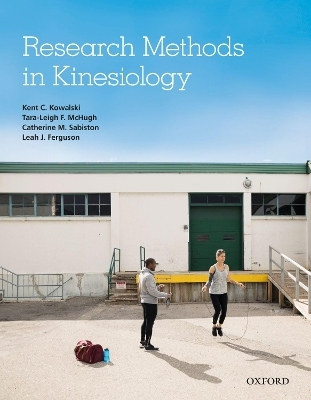
Research Methods in Kinesiology
Oxford University Press, Canada (Verlag)
978-0-19-902068-3 (ISBN)
Key features include learning outcomes, key terms, cartoons, discussion questions, and an exciting box program with case study and exercise boxes that help students gain the practical skills they need to conduct their own research, and professional and research highlight boxes that show students the variety of exciting studies being conducted across Canada today. Research Methods in Kinesiology is the go-to text for the aspiring researcher in the field of kinesiology.
Kent Kowalski is a Professor in the College of Kinesiology at the University of Saskatchewan. His research, teaching, and applied work is primarily in the area of sport, exercise, and health psychology. Most recently, his Social Sciences and Humanities Research Council of Canada (SSHRC) funded research has focused on exploring the role of self-compassion in the lives of both women and men athletes. His research spans a range of quantitative, qualitative, and mixed methods designs, and he has numerous publications in prominent journals in the field. He has been the instructor for many introductory research methods courses in kinesiology at the undergraduate and graduate level over the past two decades. Tara-Leigh McHugh is an Associate Professor in the Faculty of Kinesiology, Sport, and Recreation at the University of Alberta. She has taught research methods courses to kinesiology undergraduate and graduate students at the University of Alberta, Dalhousie University, and the University of Saskatchewan. Her research is focused on psychosocial aspects of sport and physical activity participation, and she has received numerous research grants including ongoing funding from the Social Sciences and Humanities Research Council of Canada (SSHRC). She has extensive experience with a wide range of qualitative study designs, as well as engaging in collaborative research with Indigenous communities. Her research has been disseminated in leading qualitative, health, sport, and psychology journals, as well as through numerous national and international research conference presentations. Catherine Sabiston is a Professor in the Faculty of Kinesiology and Physical Education at the University of Toronto and holds a Tier II Canada Research Chair in physical activity and mental health. She has taught kinesiology research methods, measurement and evaluation, and statistics courses at the University of British Columbia, McGill University, and the University of Toronto. She has held grants from all three tri-council funding agencies (Social Sciences and Humanities Research Council of Canada, Canadian Institutes of Health Research, and Natural Sciences and Engineering Research Council) and several other national and provincial funding agencies to conduct her quantitative and qualitative research. Her work has been disseminated in a range of psychology, health, education, and medical peer-review journals, through numerous conference presentations, public talks, and workshops, and in diverse media outlets such as television documentaries, radio shows and podcasts, reports, and featured in newspapers and popular magazines. Leah Ferguson is an Assistant Professor in the College of Kinesiology at the University of Saskatchewan. Her sport, health, and exercise psychology research focuses on young women's physical activity and psychological well-being; two parallel tracks examine ways for Indigenous and non-Indigenous athletes and youth to flourish and reach their potential. She is a mixed methods researcher, with experience in a range of quantitative and qualitative designs, methods, and analyses. Her research is provincially funded (i.e., Saskatchewan Health Research Foundation) and nationally funded through two tri-council funding agencies (i.e., Social Sciences and Humanities Research Council of Canada, Canadian Institutes of Health Research). Her research has been published in a number of prominent peer-reviewed journals, as well as delivered to local, provincial, national, and international audiences through conference presentations and workshops. She has taught research methods courses to over 600 undergraduate students at the University of Saskatchewan, where she continues to teach research methods.
Note: Each chapter also includes:
- Learning outcomes
- Summary
- Discussion questions
- Recommended readings
Preface
1. Introduction to Research in Kinesiology
Introduction: Current Knowledge in Kinesiology
Introduction to Research Methods in Kinesiology
Components of a Research Design
Philosophical Worldviews as Guiding Frameworks of Research
Text Content Overview
2. Identifying a Research Question and Study Purpose(s)
The Research Topic
The Research Problem
The Literature Search and Review
Purpose
The Research Questions and Hypotheses
3. Ethics
Ethical Standards in Research
Research with Indigenous Peoples
Animal Research Ethics
Ethical Decision-Making
4. Quantitative Study Design
Quantitative Study Design
Threats to Experimental Validity
Measurement in Quantitative Research
Sampling for Quantitative Studies
5. Data Analysis in Quantitative Studies
Introduction to Data Analysis
Descriptive Statistics
Matching Research Questions to Statistical Analyses
A Brief Primer on Hypothesis Testing
Statistical Significance versus Practical Significance
6. Evaluating the Merits of Quantitative Research Studies in Kinesiology
A Brief Primer on Validity as a Standard for Evaluating Quantitative Research
Application of Logical Validity
Application of Construct Validity
Application of Internal Validity
Application of External Validity
7. Qualitative Study Designs
Qualitative Strategies of Inquiry
Role of Theory in Qualitiative Research
Sampling for Qualitative Studies
Data Generation in Qualitiative Research
8. Data Analysis in Qualitative Studies
Introduction to Qualitiative Data Analysis
Qualitative Data Analysis as Immediate, Ongoing, and Spiral
Steps in Qualitative Data Analysis
9. Evaluating the Merits of Qualitative Research Studies in Kinesiology
A Brief Primer on Evaluating Qualitative Research
Trustworthiness as a Starting Place for Evaluation
Additional Considerations for Evaluating Qualitative Research
Taking a Relativistic Approach to Evaluating Qualitative Research
Ethics: The Bottom Line for Evaluation
10. Mixed Methods Research
Introduction to Mixed Methods Research
Planning Mixed Methods Research
Mixed Methods Research Designs
11. Participatory Action Research
Introduction to Participatory Action Research
Defining Features of PAR
Research Process
Role of Theory in PAR
Process for Engaging Underrepresented Populations in Research
Inherent Challenges of PAR
12. Knowledge Translation
What is Knowledge Translation?
Knowledge Translation Strategies
Traditional Knowledge Translation Approaches
Innovative Knowledge Translation Approaches
Selecting Knowledge Translation Strategies
Glossary
References
Index
| Erscheinungsdatum | 12.12.2022 |
|---|---|
| Zusatzinfo | 27 figures; 19 tables; 14 cartoons |
| Sprache | englisch |
| Maße | 179 x 229 mm |
| Gewicht | 476 g |
| Themenwelt | Naturwissenschaften ► Biologie |
| Weitere Fachgebiete ► Sportwissenschaft | |
| ISBN-10 | 0-19-902068-X / 019902068X |
| ISBN-13 | 978-0-19-902068-3 / 9780199020683 |
| Zustand | Neuware |
| Haben Sie eine Frage zum Produkt? |
aus dem Bereich


